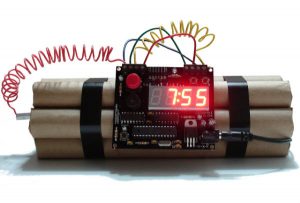The bug of the Atom C2XXX chip will begin to manifest itself after 18 months of operation: the equipment of Cisco and other companies will suffer
 There is a bug in the Intel Atom C2000 processor family that disables Cisco devices and other manufacturers (the exact list of products is known for Cisco, but not for other companies: check which chip is installed in your hardware). The bug acts like a time bomb, manifesting itself not immediately, but only after about 1.5 years of active use or later.
There is a bug in the Intel Atom C2000 processor family that disables Cisco devices and other manufacturers (the exact list of products is known for Cisco, but not for other companies: check which chip is installed in your hardware). The bug acts like a time bomb, manifesting itself not immediately, but only after about 1.5 years of active use or later.At the conference for investors on the results of the IV quarter. 2016 Intel Chief Financial Officer Robert Swan (Robert Swan) mentioned the problem with one of the products in the IV quarter. 2016, which affected the financial performance. The financier did not say what particular product he is talking about. But all secret sooner or later becomes clear.
Robert Swan told investors about the “quality problem,” because of which “the product failure rate slightly increased under certain conditions and time frames.” For this, we had to allocate a certain reserve, which slightly affected the performance (in IV quarter. Gross profit margin decreased by two percentage points to 63%, but the bug in the processors was not the only reason, so it’s impossible to write everything off only on it). "We think that we will limit its [damage] relatively well by a small change in the architecture we are working on with our customers."

')
What is this bug? Since Intel does not disclose information, you have to figure it out yourself, but with the help of common sense and logic you can get to the bottom of the truth.
Coincidentally, just last week, Cisco issued a warning about a problem with a clock signal in some of its devices, including routers, switches, and other equipment. As it became known, the bug is present in a specific component of “one of the suppliers”. As a result, in some devices, the clock signal fades with time. According to Cisco, all problematic devices should work normally for the first time, but gradually begin to fail after about 18 months of operation. The number of failures will increase depending on the duration of operation. When this particular component fails, the device will cease to function, it will be impossible to either turn it on or repair it, except to solder the processor.
The list of devices that face failure after 18 months of operation:
| Optical networks | FN-64230 | NCS1K-CNTLR |
| Routers | FN-64231 | NCS 5500 cards |
| FN-64252 | Industrial routers with integrated services IR809 / IR829 | |
| FN-64253 | ISR4331, ISR4321, ISR4351 and UCS-E120 | |
| Security | FN-64228 | ASA 5506, ASA 5506W, ASA 5506H, ASA 5508 and ASA 5516 |
| FN-64250 | Cisco ISA 3000 Industrial Security Appliance | |
| Meraki notification | MX 84 | |
| Switches | FN-64251 | Nexus 9000 Series N9K-C9504-FM-E / N9K-C9508-FM-E / N9K-X9732C-EX |
| Meraki notification | MS350 Series |
Judging by the popularity of Cisco products, a large amount of equipment may suffer. Among networkers, there is information that Cisco managers are already ringing up customers and proactively replacing equipment that has not yet failed.
"This component is also used by other companies," Cisco noted in the warning, again without informing the name of the component or the supplier company.
However, one could already guess about the supplier company.
In January 2017, Intel released updated specifications for the Intel Atom C2000 processor family, in which it pointed to a “new” problem with a sync signal. This is stated on page 34 of the specification update in note AVR54.

It is written that the signals LPC_CLKOUT0 and / or LPC_CLKOUT1 (output signals of the bus pin Low Pin Count ) may stop functioning. In this case, the device can no longer be loaded, because no other electronics are working without synchronization. It is indicated that a fix at the platform level can be implemented to solve the problem.
An Intel spokesperson explained the problem as "degradation of the chip element under high load after several years of use." Degradation occurs so often that it does not meet Intel’s quality standards, he said.
It should be noted that neither Intel or Cisco has yet officially confirmed that the proactive replacement of Cisco devices is caused by a problem with the component in the Atom C2000, but the picture is very clear. An Intel spokesman did not agree to either confirm or deny this information.
The documentation states that the failing component is stepping B0 in Atom C2XX processors, these are:
C2308, C2338, C2350, C2358, C2508, C2518, C2530, C2538, C2550, C2558, C2718, C2730, C2738, C2750 and C2758 .
They are sold since 2013.
Atom C2XX processors employ numerous devices from other manufacturers, including ASRock Rack (C2550D4I and C2750D4I), Aaeon, Dell, HP, Infortrend, iXsystems (FreeNAS Mini), Lanner, NEC, Newisys, Netgate, Netgear, Quanta, Seagate (NAS Pro), Sophos (UTM firewall SG 125), Supermicro, Synology, ZNYX Networks.
It's a shame if the equipment fails just after the end of the warranty period, as if it were planned.
Source: https://habr.com/ru/post/370151/
All Articles